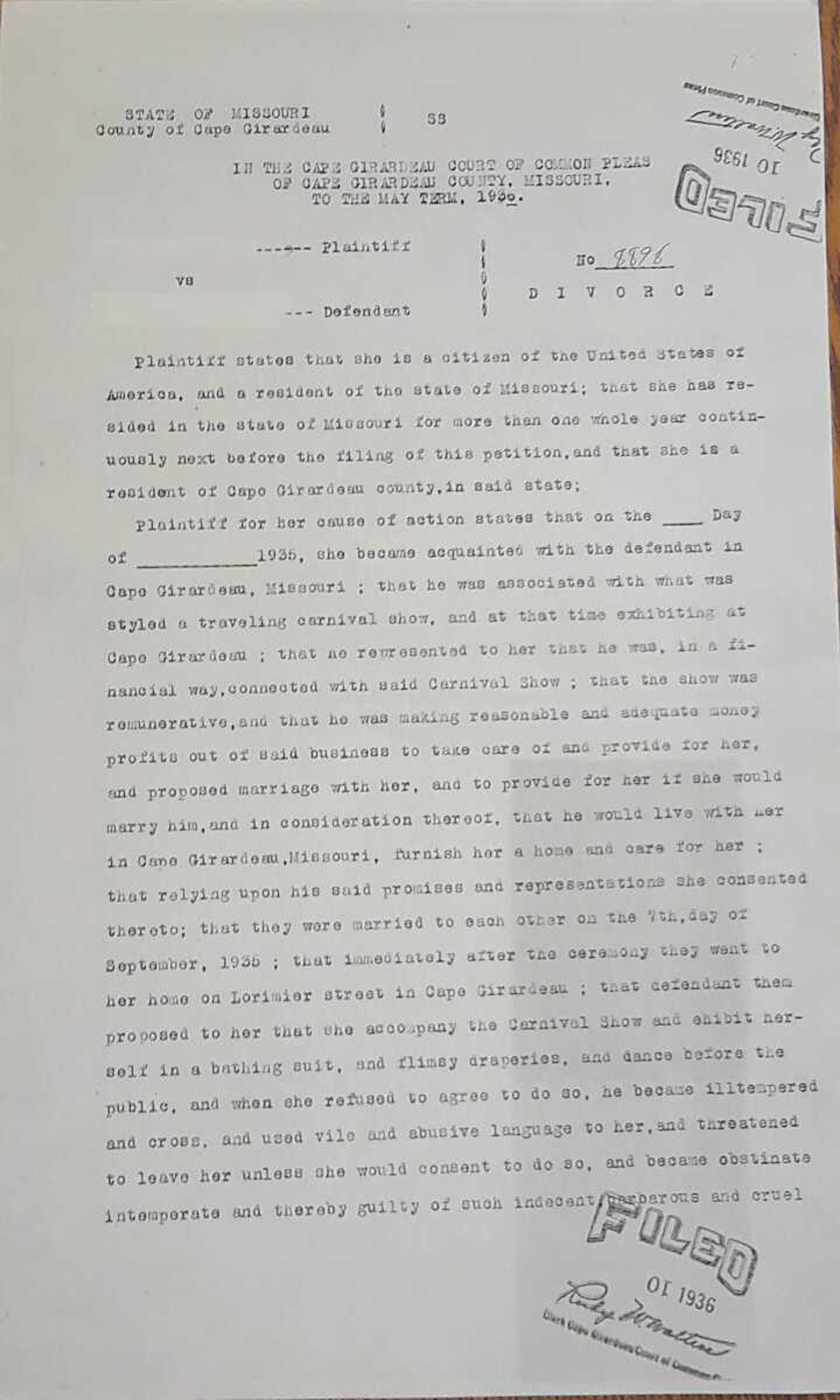Connecting the Dots of the County’s History
Narratives of enslaved peoples and divorce documents at the Cape Girardeau County Archives
When facing an archive of an estimated one million pages of documents, how would someone keep everything organized?
Indexes at the Cape Girardeau County Archives provide an accessible, easier way for researchers to answer questions about the county’s history. Director Marybeth Niederkorn and archival assistant Lyle Johnston create indexes of certain aspects of the county’s history.
“I consider myself a storyteller, and much of genealogy is connecting points into a narrative,” Niederkorn says. “We can help to sketch out details about people who are only vaguely remembered or never met.”
Sometimes, the three-ring binders holding those indexes can carry the missing piece to learning about a family’s history.
Most recently, Niederkorn has been creating an index of narratives of enslaved persons in the county. When researching their ancestors, relatives of enslaved persons may have difficulty locating correct and consistent information.
Records may be incomplete or inaccurate — especially concerning names — and Niederkorn hopes to make the history of the individuals more clear. Records of birth dates may only include approximate birth years, which can be frustrating for researchers. Her final goal is to create a list of full names and birthdates.
Volunteers fluent in German are also invited to help uncover parts of the county’s past. Some documents in the archives, such as a long-running newspaper “Deutscher Volksfreund,” are available only in Kurrent, an Old German script; neither Niederkorn nor Johnston speak the language.
When the archives opened, Johnston says an employee was available to translate the Old German script into modern English; however, they have not encountered a similar translator for the past 20 years.
Translating this particular type of Old German script into English can be especially difficult, Niederkorn says; in addition to the language barrier, many letters in the script may appear differently. This can cause some confusion when the letter “L” is mixed up with the letter “B” — which often happens.
In the 1800s, some households in the area spoke exclusively German.
Johnston shares a humorous story: When he was indexing divorce records, he says he noticed a husband, reluctant to adhere to his wife’s divorce request, signed the document in that Kurrent script.
In addition to that one particular record, Johnston spent several months indexing divorce records from the 1800s; he says he encountered several unusual reasons listed on the petition for divorce records. Cross-country moves resulted in several couples’ reasons for splitting; another cited the reason as the couple having seven children and the mother not wanting any more.
Divorce documents can be an integral part of piecing together family history, Niederkorn says. In addition, they can be helpful documentation for state licensing; divorce records can be utilized to verify a resident’s name when applying for a Real ID card, which are required identification for air travel by May 2023.
Johnston received a visit from two individuals searching for their parents’ divorce records, anticipating to share the reason behind the split at an upcoming family reunion.
“A lot of what our genealogy researchers are looking for is information on the kinds of lives their ancestors lived,” Niederkorn says. “We can get some clues based on where their land was, how much land they had and how they got it.”
Sometimes, individuals who didn’t own land or appear on census records slip through the cracks; it’s difficult to see researchers leave disappointed when searching for someone without a paper trail. Whenever possible, Niederkorn says she searches records in surrounding counties for any leads.
There also may be differences in searching townships surrounding Cape Girardeau, Johnston says. At one time, the township of Tilsit was named “Farmer’s Village;” at another point, it was called “Prairie Village.” His compiled history of the county helps to solve any confusion in locations, Johnston says.
Tracing genealogy through records at the Archives can help to ground individuals in stories from their family’s past.
“I think a story of a place is really important to people,” Niederkorn says. “If they don’t have that, we can help to shed a little light.”
Indexes at the Cape Girardeau County Archives clear confusion and guide researchers in the right direction. Some indexes — such as Niederkorn’s records of enslaved persons — can connect histories that may have otherwise been incomplete.
_
Knowledge Seekers
Those interested in digging into their family’s history or obtaining documents to apply for the Real ID can consult Marybeth Niederkorn and Lyle Johnston at the Cape Girardeau County Archives located at 112 E. Washington St. in Jackson. Only Cape Girardeau County records are available at the center.
Visitors can access the public records from 8:30 a.m. to 4:30 p.m. Monday through Friday and from 8:30 a.m. to 12:30 p.m. on Saturdays.
Connect with the Southeast Missourian Newsroom:
For corrections to this story or other insights for the editor, click here. To submit a letter to the editor, click here. To learn about the Southeast Missourian’s AI Policy, click here.










